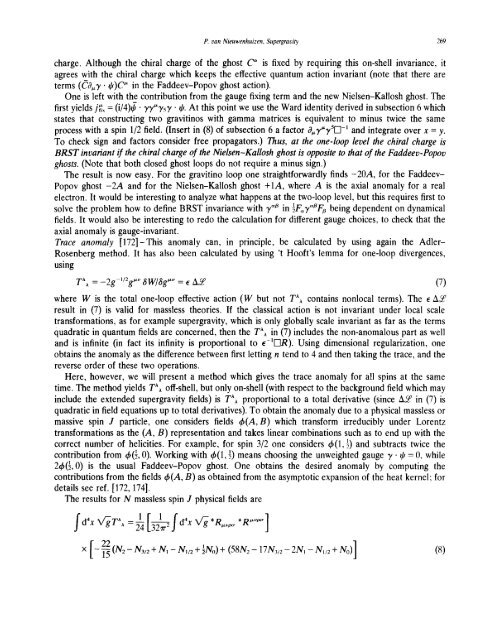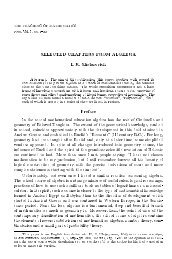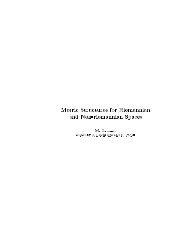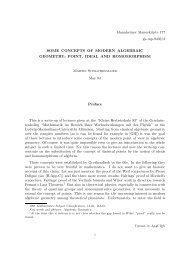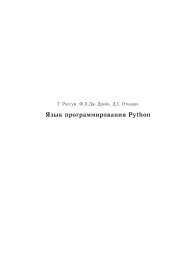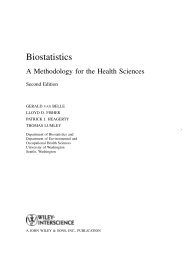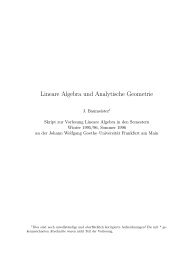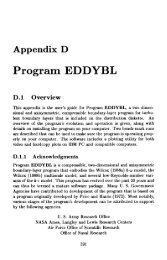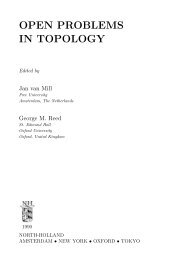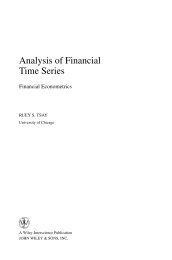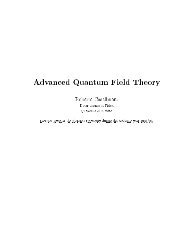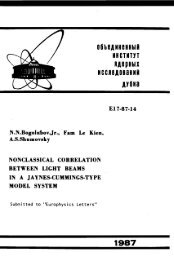268 P. Lan Nieuwenhui:en. SupergraLitvAxial anomaly — The action of a gravitino in a background gravitational field= ~ (1)is gauge invariant under 64,,, = D,,(w(e)) , if the gravitational field satisfies the Einstein equationsGMV(e) = 0. Thus one must fix the gauge. Two obvious choices are~2?’(fix) = ~ yjy• 4’, 2?”(fix) = ~ y,ø(w(e))y. 4,. (2)In the second choice, the quantum action is manifestly general coordinate invariant, but one must addNielsen—Kallosh ghosts (see subsection 2.4). In this gauge one can apply the well-known Adler—Rosenberg method for obtaining the axial anomaly. Denoting the matrix element for the axial currentgoing to two gravitons (a, /3, p’) and (y, 6, p2) by MM~~, 5(p, P2)’ general coordinate invariance= 0 relates divergent to convergent form factors, and the axial anomaly A =(Pl.M +p2,M)MM,,,,.,,.,,s = 0 can be expressed in terms of finite integrals. Clearly, the contributions of thecomplex and real spin 1/2 ghosts (both commuting) are known from the spin 1/2 axial anomaly, and oneonly has to apply the Adler—Rosenberg method to the gravitino loop. The answer is —21 times theanomaly for a real anticommuting spin 1/2 field, and was first obtained by Duff and Christensen by atopological method [172]. Here we will follow the Adler—Rosenberg method. For comparison betweenthe various existing methods, see ref. [530].We must begin by writing down the axial currents. The classical axial current is the Noether currentfor the global symmetry 64’, == —! ~M~P~74jy4j (3)and transforms under gauge transformations 64,,, = D,(w(e)) into= _ia,,E M~‘~(4,,.y,,e) — iiy 5R M (4)so that the classical axial charge is gauge invariant on-shell. At the quantum level the gravitino equationacquires an extra term from the gauge fixing term [344]— 3J~U/~q, = M~”y5y,.D~i/i,, — ~ yMØy. 4,. (5)At the quantum level we also use BRST transformations rather than gauge transformations, and with.SC = A (— ~4, y,~)one finds that the axial current due to the Faddeev—Popov ghost action (whichcorresponds to F,, = —y~4’) transforms under BRST transformations as followsj~= ieC’y My 5C, 6j~p= — ~ eçti y,Ø7M75CA (6)and the extra term in (5) is produced by (6) so that again j7~+j~gives on-shell a BRST-invariant
P. <strong>van</strong> Nieuwenhuizen. Supergravity 269charge. Although the chiral charge of the ghost C~is fixed by requiring this on-shell invariance, itagrees with the chiral charge which keeps the effective quantum action invariant (note that there areterms (CôMy~çfj)CM in the Faddeev—Popov ghost action).One is left with the contribution from the gauge fixing term and the new Nielsen—Kallosh ghost. Thefirst yieldsj~= (i/4)4r. ~~ M75~ 4,. At this point we use the Ward identity derived in subsection 6 whichstates that constructing two gravitinos with gamma matrices is equivalent to minus twice the sameprocess with a spin 1/2 field. (Insert in (8) of subsection 6 a factor 8MYMYSE_l and integrate over x = y.<strong>To</strong> check sign and factors consider free propagators.) Thus, at the one-loop level the chiral charge isBRST invariant if the chiral charge of the Nielsen—Kallosh ghost is opposite to that of the Faddeev-Fopovghosts. (Note that both closed ghost loops do not require a minus sign.)The result is now easy. For the gravitino loop one straightforwardly finds —20A, for the Faddeev—Popov ghost —2A and for the Nielsen—Kallosh ghost +1A, where A is the axial anomaly for a realelectron. It would be interesting to analyze what happens at the two-loop level, but this requires first tosolve the problem how to define BRST invariance with y” in ~F,,y”F~being dependent on dynamicalfields. It would also be interesting to redo the calculation for different gauge choices, to check that theaxial anomaly is gauge-invariant.Trace anomaly [172]—This anomaly can, in principle, be calculated by using again the Adler—Rosenberg method. It has also been calculated by using ‘t Hooft’s lemma for one-loop divergences,usingTi,, = _2g”2gMP 6W/ôgTM’ = £2’ (7)where W is the total one-loop effective action (W but not Ti,, contains nonlocal terms). The £2’result in (7) is valid for massiess theories. If the classical action is not invariant under local scaletransformations, as for example supergravity, which is only globally scale invariant as far as the termsquadratic in quantum fields are concerned, then the Ti,, in (7) includes the non-anomalous part as welland is infinite (in fact its infinity is proportional to 1L1R). Using dimensional regularization, oneobtains the anomaly as the difference between first letting n tend to 4 and then taking the trace, and thereverse order of these two operations.Here, however, we will present a method which gives the trace anomaly for all spins at the sametime. The method yields Ta,, off-shell, but only on-shell (with respect to the background field which mayinclude the extended supergravity fields) is Ti,, proportional to a total derivative (since £Sff in (7) isquadratic in field equations up to total derivatives). <strong>To</strong> obtain the anomaly due to a physical massless ormassive spin J particle, one considers fields 4’(A, B) which transform irreducibly under Lorentztransformations as the (A, B) representation and takes linear combinations such as to end up with thecorrect number of helicities. For example, for spin 3/2 one considers 4,(1, ~)and subtracts twice thecontribution from 4)(~,0). Working with 4’(1, ~)means choosing the unweighted gauge y~4, = 0, while24’(~,0) is the usual Faddeev—Popov ghost. One obtains the desired anomaly by computing thecontributions from the fields 4’(A, B) as obtained from the asymptotic expansion of the heat kernel; fordetails see ref. [172,174].The results for N massless spin J physical fields areI .~4— J.., [.....~L... I ,.~4 * D * DM”P”~ x g A — ~ L3~iT2~ ~ x g 1’MVP” ~x[—~ (N2 — N312 + N, — N,,2 + ~N0)+ (58N2 — 17N,,,2 — 2N1 — N112 + No)] (8)
- Page 3 and 4:
In memoriam Joel ScherkJoel Scherk
- Page 6 and 7:
194 P. van Nieuwenhuizen, Supergrav
- Page 8 and 9:
196 P. van Nieuwenhuizen, Supergrav
- Page 10 and 11:
198 P. van Nieuwenhuizen, Supergrav
- Page 12 and 13:
200 P. van Nieuwenhuizen. Supergrav
- Page 14 and 15:
202 P. tan Nieuwenhuizen, Supergrav
- Page 16 and 17:
204 P. van Nieuwenhuizen, Supergrav
- Page 18 and 19:
206 P. van Nieuwenhuizen. Supergrav
- Page 20 and 21:
208 P. van Nieuwenhuizen. Supergrar
- Page 22 and 23:
210 P. van Nieuwenhuizen. Supergrav
- Page 24 and 25:
212 P. van Nieuwenhuizen. Supergrav
- Page 26 and 27:
214 P. van Nieuwenhuizen, Supergrav
- Page 28 and 29:
216 P. van Nieuwenhuizen, Supergrav
- Page 30 and 31: 218 P. van Nieuwenhuizen. Supergrav
- Page 32 and 33: 220 P. ran Nieuwenhuizen. Supergrar
- Page 34 and 35: 222 P. van Nieuwenhuizen, Supergrav
- Page 36 and 37: 224 P. van Nieuwenhuizen, Supergrav
- Page 38 and 39: 226 P. van Nieuwenhuizen, Supergrav
- Page 40 and 41: 228 P. van Nieuwenhuizen, Supergrav
- Page 42 and 43: 230 P. van Nieuwenhuizen, Supergrav
- Page 44 and 45: 232 P. van Nieuwenhuizen, Supergrav
- Page 46 and 47: 234 P. van Nieuwenhuizen, Supergrav
- Page 48 and 49: 236 P. van Nieuwenhuizen, Supergrav
- Page 50 and 51: 238 P. van Nieuwenhuizen. Supergrav
- Page 52 and 53: 240 P. van Nieuwenhuizen. Supergrav
- Page 54 and 55: 242 P. van Nieuwenhuizen, Supergrav
- Page 56 and 57: 244 P. van Nieuwenhuizen. Supergrav
- Page 58 and 59: 246 P. van Nieuwenhuizen, Supergrav
- Page 60 and 61: 248 P. van Nieuwenhuizen. Supergrav
- Page 62 and 63: 250 P. ran Nieuwenhuizen, Supergrav
- Page 64 and 65: 252 P. van Nieuwenhuizen, Supergrav
- Page 66 and 67: 254 P. van Nieuwenhuizen. Supergrav
- Page 68 and 69: 256 P. van Nieuwenhuizen, Supergrav
- Page 70 and 71: 258 P. van Nieuwenhuizen, Supergrav
- Page 72 and 73: 260 P. van Nieuwenhuizen, Supergrav
- Page 74 and 75: 262 P. van Nieuwenhuizen. Supergrav
- Page 76 and 77: 264 P. van Nieuwenhuizen. Supergrav
- Page 78 and 79: 266 P. van Nieuwenhuizen, Supergrav
- Page 82 and 83: 270 P. van Nieuwenhuizen. Supergrav
- Page 84 and 85: 272 P. van Nieuwenhuizen, Supergrav
- Page 86 and 87: 274 P. van Nieuwenhuizen, Supergrav
- Page 88 and 89: 276 P. van Nieuwenhuizen, Supergrav
- Page 90 and 91: 278 P. t’an Nieuwenhuizen, Superg
- Page 92 and 93: 280 P. van Nieuwenhuizen, Supergrav
- Page 94 and 95: 282 P. van Nieuwenhuizen. Supergrav
- Page 96 and 97: 284 P. van Nieuwenhuizen. Supergrav
- Page 98 and 99: 286 P. van Nieuwenhuizen. Supergrav
- Page 100 and 101: 288 P. van Nieuwenhuizen, Supergrav
- Page 102 and 103: 290 P. van Nieuwenhuizen, Supergrav
- Page 104 and 105: 292 P. van Nieuwenhuizen. Supergrav
- Page 106 and 107: 294 P. van Nieuwenhuizen, Supergrav
- Page 108 and 109: 296 P. van Nieuwenhuizen, Supergrav
- Page 110 and 111: 298 P. van Nieuwenhuizen, Supergrav
- Page 112 and 113: 300 P. van Nieuwenhuizen, Supergrav
- Page 114 and 115: 302 P. van Nieuwenhuizen, Supergrav
- Page 116 and 117: 304 P. van Nieuwenhuizen, Supergrav
- Page 118 and 119: 306 P. van Nieuwenhuizen, Supergrav
- Page 120 and 121: 308 P. van Nieuwenhuizen. Supergrav
- Page 122 and 123: 310 P. van Nieuwenhuizen, Supergrav
- Page 124 and 125: 312 P. van Nieuwenhuizen. Supergrav
- Page 126 and 127: (A V,.”)00 = ~ s*a = (D,. + ~ A,.
- Page 128 and 129: 316 P. van Nieuwenhuizen. Supergrav
- Page 130 and 131:
318 P. van Nieuwenhuizen, Supergrav
- Page 132 and 133:
320 P. van Nieuwenhuizen. Supergrav
- Page 134 and 135:
322 P. van Nieuwenhuizen, Supergrav
- Page 136 and 137:
324 P. van Nieuwenhuizen. Supergrav
- Page 138 and 139:
326 P. van Nieuwenhuizen, Supergrav
- Page 140 and 141:
328 P. van Nicuwenhuizen, Supergrav
- Page 142 and 143:
330 P. van Nieuwenhuizen Supergravi
- Page 144 and 145:
332 P. van Nieuwenhuizen, Supergrav
- Page 146 and 147:
334 P. van Nieuwenhuizen, Supergrav
- Page 148 and 149:
336 P. van Nieuwenhuizen, Supergrav
- Page 150 and 151:
338 P. van Nieuwenhuizen, Supergrav
- Page 152 and 153:
340 P. van Nieuwenhuizen, Supergrav
- Page 154 and 155:
342 P. van Nieuwenhuizen, Supergrav
- Page 156 and 157:
344 P. van Nieuwenhuizen, Supergrav
- Page 158 and 159:
346 P. van Nieuwenhuizen, Supergrav
- Page 160 and 161:
348 P. van Nieuwenhuizen, Supergrav
- Page 162 and 163:
350 P. van Nieuwenhuizen. Supergrav
- Page 164 and 165:
352 P. van Nieuwenhuizen, Supergrav
- Page 166 and 167:
354 P. van Nieuwenhuizen Supergravi
- Page 168 and 169:
356 P. van Nieuwenhuizen, Supergrav
- Page 170 and 171:
358 P. van Nieuwenhuizen, Supergrav
- Page 172 and 173:
360 P. van Nieuwenhuizen, Supergrav
- Page 174 and 175:
362 P. van Nieuwenhuizen. Supergrav
- Page 176 and 177:
364 P. van Nieuwenhuizen, Supergrav
- Page 178 and 179:
366 P. van Nieuwenhuizen, Supergrav
- Page 180 and 181:
368 P. van Nieuwenhuizen, Supergrav
- Page 182 and 183:
370 P. van Nieuwenhuizen, Supergrav
- Page 184 and 185:
372 P. van Nieuwenhuizen. Supergrav
- Page 186 and 187:
374 P. van Nieuwenhuizen, Supergrav
- Page 188 and 189:
376 P. van Nieuwenhuizen, Supergrav
- Page 190 and 191:
378 P. van Nieuwenhuizen, Supergrav
- Page 192 and 193:
380 P. van Nieuwenhuizen. Supergrav
- Page 194 and 195:
382 P. van Nieuwenhuizen. Supergrav
- Page 196 and 197:
384 P. van Nieuwenhuizen. Supergrav
- Page 198 and 199:
386 P. van Nieuwenhuizen, Supergrav
- Page 200 and 201:
388 P. van Nieuwenhuizen. Supergrav
- Page 202 and 203:
390 P. van Nieuwenhuizen, Supergrav
- Page 204 and 205:
392 P. van Nieuwenhui’zen, Superg
- Page 206 and 207:
394 P. van Nieuwenhuizen, Supergrav
- Page 208 and 209:
396 P. van Nieuwenhuizen. Supergrav
- Page 210:
398 P. van Nieuwenhuizen, Supergrav


